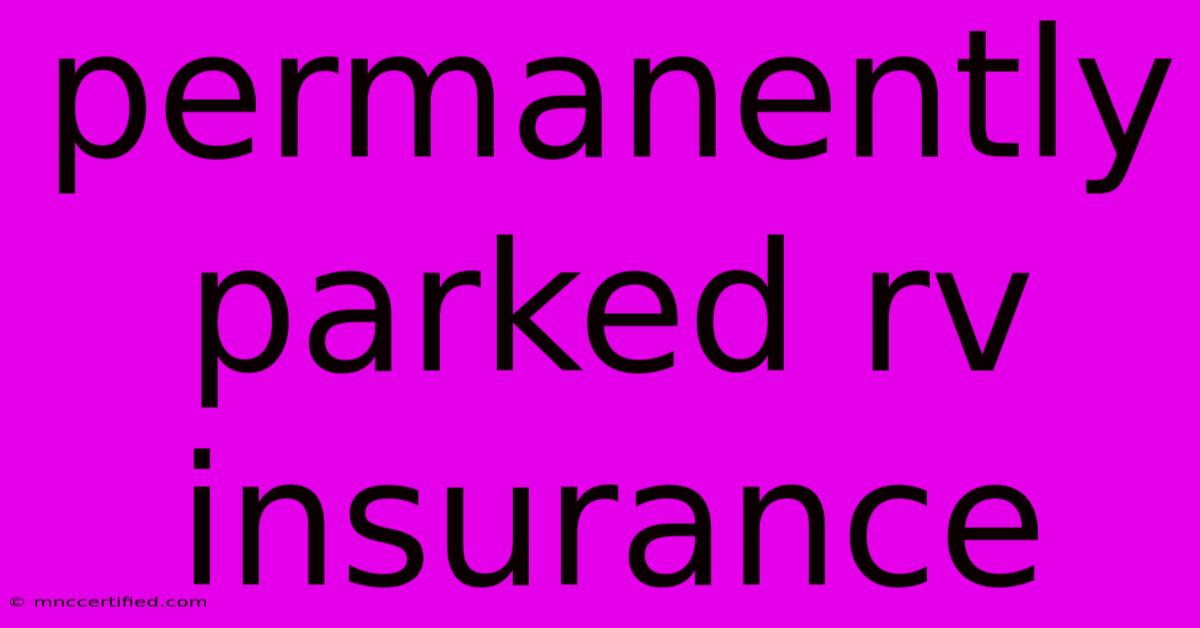Permanently Parked Rv Insurance

Table of Contents
Permanently Parked RV Insurance: Protecting Your Investment
Owning an RV is a dream for many, offering the freedom of the open road and the comfort of home. But what happens when that dream becomes a reality, and your RV becomes a permanent fixture on your property? Standard RV insurance policies often fall short when it comes to covering a permanently parked RV. This comprehensive guide will explore the unique insurance needs of permanently parked RVs and help you find the right coverage to protect your significant investment.
Why Standard RV Insurance Isn't Enough
Most standard RV insurance policies are designed for RVs that are regularly driven. They cover risks associated with travel, such as accidents, collisions, and liability while on the road. However, when your RV is permanently parked, these risks are significantly reduced. Conversely, new risks emerge, such as:
- Damage from weather: Hail, wind, snow, and even extreme heat can cause significant damage to a stationary RV.
- Vandalism and theft: A parked RV is a tempting target for thieves and vandals, especially if it's not properly secured.
- Fire: Electrical malfunctions or other causes of fire pose a serious threat to a parked RV.
- Liability: While the risk is lower than with a traveling RV, you could still be liable for accidents or injuries that occur on your property involving your RV.
Standard policies may offer limited coverage for these risks, or they might exclude them entirely. This is why securing specialized permanently parked RV insurance is crucial.
Finding the Right Coverage: What to Look For
When searching for insurance for your permanently parked RV, consider these key factors:
Comprehensive Coverage: This is vital to protect against a wide range of potential damages, including those listed above (weather, vandalism, fire, etc.). Make sure the policy explicitly covers these risks for a stationary vehicle.
Liability Coverage: This protects you financially if someone is injured on your property due to your RV. The level of coverage you need will depend on several factors, including the location of your property and local laws.
Personal Property Coverage: Your RV likely contains valuable personal belongings. Ensure your policy includes coverage for these items in case of theft or damage. Consider specifying the value of your possessions for accurate coverage.
Specific Exclusions: Carefully review the policy's exclusions. Some policies might exclude coverage for certain types of damage or under specific circumstances. Understanding these limitations is crucial to avoid unexpected costs.
Deductibles: Choose a deductible you can comfortably afford. A higher deductible typically leads to lower premiums, but you'll pay more out-of-pocket in case of a claim.
Types of Insurance Options for Permanently Parked RVs
You may find that several options are available, depending on your insurer and location:
- Homeowners or Renters Insurance: Some homeowners and renters insurance policies might extend coverage to include structures on your property, potentially covering your RV if it's considered a permanent structure. Check with your provider.
- Specialized RV Insurance with Modifications: Some RV insurance companies offer modified policies for permanently parked RVs, adjusting coverage to reflect the reduced risk of travel-related incidents.
- Flood Insurance: If your RV is located in a flood-prone area, you will need separate flood insurance. This is rarely included in standard RV policies.
Tips for Reducing Your Risk
While insurance is essential, taking proactive steps to protect your RV can further minimize your risk and potentially lower your premiums:
- Proper Security: Install security systems, including alarms and locks, to deter theft and vandalism.
- Regular Maintenance: Regular maintenance prevents costly repairs down the line.
- Weather Protection: Take steps to protect your RV from the elements, such as using a cover or storing it in a protected area.
- Proper Site Preparation: Ensure the site where your RV is parked is level and well-maintained to prevent damage.
Conclusion: Protecting Your Investment
Insuring a permanently parked RV requires a different approach than insuring a travel RV. Understanding the unique risks and finding the right insurance coverage are crucial steps in protecting your investment. By carefully considering the factors discussed above and choosing a policy that meets your specific needs, you can secure the peace of mind that comes with knowing your RV is adequately protected. Remember to shop around and compare quotes from multiple insurers to find the best value and coverage.

Thank you for visiting our website wich cover about Permanently Parked Rv Insurance. We hope the information provided has been useful to you. Feel free to contact us if you have any questions or need further assistance. See you next time and dont miss to bookmark.
Featured Posts
-
Mc Gregor Loses Sexual Assault Civil Case
Nov 23, 2024
-
Bonded Nylon Thread For Leather
Nov 23, 2024
-
Aba Therapy Cost With Insurance
Nov 23, 2024
-
Medical Wigs Covered By Insurance
Nov 23, 2024
-
Arsenal Vs Forest Premier League Match Preview
Nov 23, 2024